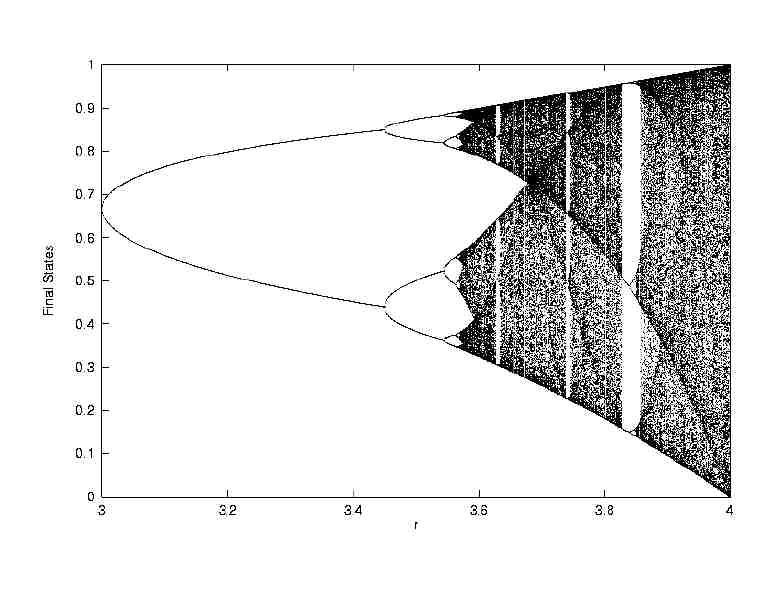James Madison University - Department of Geology & Environmental Science
Teaching Chaos and Complex Evolutionary Systems Theories at the Introductory Level
But First:
What is Chaos Theory?
Strategies and Rubrics for Teaching Chaos and Complex Systems Theories as Elaborating, Self-Organizing, and Fractionating Evolutionary Systems,
Fichter, Lynn S., Pyle, E.J., and Whitmeyer, S.J., 2010, Journal of Geoscience Education (in press)Or, the behavior of a simple system - simple algorithm - becomes more complex and more unpredictable the harder the system is pushed.
This is not intuititely obvious.
For example, the logistic system Xnext = rX (1-X) is a simple growth model that conventionally produces an 'S' shaped curve of initial exponential growth that soon levels off to equilibrium.
But, the same logistic system also generates this bifurcation diagram which is not simple.

Chaos Theory (technically known as deterministic chaos) studies why and how the behavior of simple systems — simple algorithms — becomes more complex and unpredictable as the energy/information the system dissipates increases.
Because chaos theory was discovered more or less independently by a number of workers in different disciplines there are a variety of definitions/descriptions. We use two definitions:
- Chaos Definition One: "the quantitative study of unstable aperiodic behavior in deterministic non-linear systems.” Frankly this is a bit opaque unless you already have a lot of experience observing the behavior of chaotic systems.
- Chaos Definition Two: the logistic system Xnext = rX (1-X), or actually the behavior of this system. And, since this system can be modeled in a computer, in class, in real time, it is the way we introduce chaos theory.
It is not deductively obvious that all the complex behavior in the bifurcation diagram is really there. It must be experienced. If we tell someone that the behavior of a very simple system - like a swinging pendulum - will become astronomically complex they may accept it just because we tell them (because we are the teacher and they are the student), but that is not the same as knowing and believing it in your gut. Especially if you have been told your whole life that simple causes produce simple effects.
You have to see for youself, be confronted with the marvel and mystery so that you know what you saw, even if you are not quite sure yet you believe what you saw. That is what these rubrics are designed to do. At some stage understanding the phenomena analytically (mathematically) will be important, but we have to start empirically.
 Lynn S. Fichter
Lynn S. Fichter
 Steve Baedke
Steve Baedke
 Eric Pyle
Eric Pyle
 Steve Whitmeyer
Steve Whitmeyer